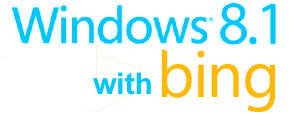 If you’ve been computer shopping recently, you’ve no doubt noticed the plethora of laptops priced around $200. It seems they’re everywhere these days, and even the big name-brands are selling them.
If you’ve been computer shopping recently, you’ve no doubt noticed the plethora of laptops priced around $200. It seems they’re everywhere these days, and even the big name-brands are selling them.
If you’re wondering how the computer manufacturers can afford to sell a Windows laptop for $200, it basically boils down to one reason: Microsoft’s release of Windows 8.1 with Bing.
At its core, Windows 8.1 with Bing is exactly the same operating system as the standard Windows 8.1, but two things differentiate Windows 8.1 with Bing from standard Windows 8.1:
1 – Windows 8.1 with Bing comes with Bing set as Internet Explorer’s default search engine, and the computer manufacturers who install it on their PC’s are not allowed to change the default search engine to Google or any other search engine before selling the machines to end users. They MUST leave the browser’s default search engine set to Bing.
The good news is this limitation only applies to manufacturers, not end users. After you have purchased a laptop running Windows 8.1 with Bing, you are free to replace Bing with Google or any other search engine in the Internet Explorer settings. In fact, you can even install Chrome, Firefox, or any other preferred web browser and effectively ditch IE itself.
2 – Unlike all other versions of Windows 8.1, Windows 8.1 with Bing is completely free for both computer manufacturers and end users. Manufacturers can download and install Windows 8.1 with Bing on their PCs without paying as much as a single penny to Microsoft, then pass that savings on to you, the consumer.
Windows 8.1 for Bing can only be shipped with PCs that cost $250 or less and tablets with screens that are smaller than 9 inches (which is why we’re also now seeing Windows 8.1 tablets selling for $100).
So why did Microsoft decide to start literally giving away a full-featured version of Windows 8.1? In order to compete in the low-cost computer and tablet market. Inexpensive laptops and tablets running the free Google Chrome OS and Android were stealing market share from Windows by leaps and bounds, and Microsoft felt they had to do something to put the brakes on it. Hence Windows 8.1 with Bing!
Bottom line: Windows 8.1 with Bing has allowed manufacturers to begin selling name-brand Windows laptops and tablets at bargain-basement prices. And in my opinion that’s a good thing because it opens up the world of personal computing to a much broader segment of the population.
While you won’t get the fastest, most powerful machine on the block, if you primarily plan to use your new PC or tablet for browsing the Internet, sending and receiving email, Facebooking, and other tasks that don’t require a lot of computing power, one of these ultra-budget machines will probably serve you quite well.